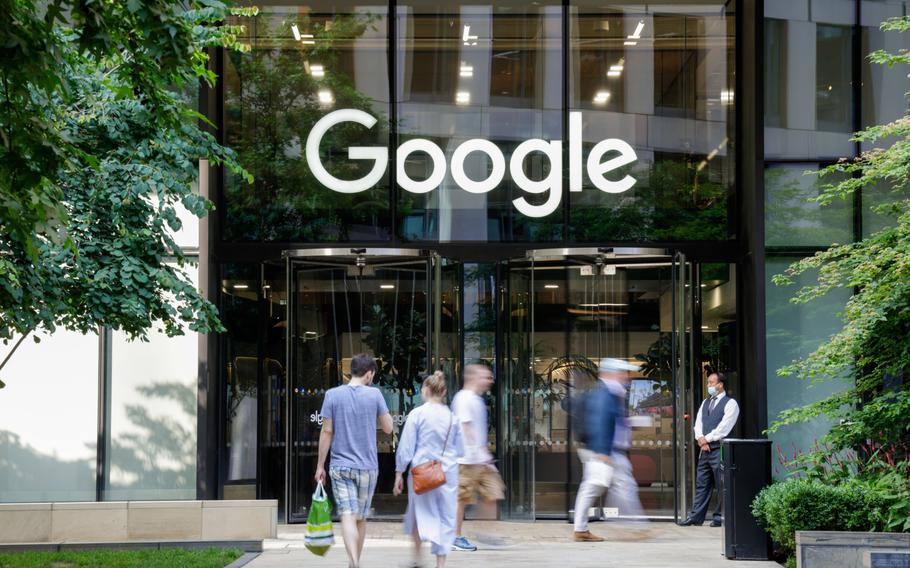
Commuters outside the Google offices in the King’s Cross Central development in London, U.K., on Monday, July 19, 2021. Boris Johnson’s plan to get the U.K. back to normal is in disarray, with Covid-19 cases rising the most in the world and a public outcry over the prime minister’s perceived attempt to dodge isolation rules. (Jason Alden/Bloomberg)
The U.S. Justice Department and eight states sued Alphabet’s Google, calling for the break up of the search giant’s ad-technology business over alleged illegal monopolization of the digital advertising market.
“Google abuses its monopoly power to disadvantage website publishers and advertisers who dare to use competing ad tech products in a search for higher quality, or lower cost, matches,” the Justice Department said in the complaint, which was filed in federal court in Virginia. New York, California and Virginia were among the states that signed on to the complaint.
The lawsuit represents the Biden administration’s first major case challenging the power of one of the nation’s largest tech companies, following through on a probe that began under former president Donald Trump. It also marks one of the few times the Justice Department has called for the breakup of a major company since it dismantled the Bell telecom system in 1982.
Google is the dominant player in the $278.6 billion U.S. digital-ad market, controlling most of the technology used to buy, sell and serve online advertising. A resolution in the case could be years away.
The lawsuit marks the DOJ’s second antitrust suit against Google and the fifth major case in the U.S. challenging the company’s business practices. State attorneys general have filed three separate suits against Google, alleging it dominates the markets for online search, advertising technology and apps on the Android mobile platform in violation of antitrust laws.
The allegations in the DOJ’s suit mirror those brought by attorneys general in 16 states plus Puerto Rico in 2020. That lawsuit is pending in New York federal court.
The Mountain View, California-based company is No. 1 in the $626.9 billion global digital ad market, according to 2023 estimates by research firm EMarketer, with the U.S. representing the biggest piece. Alphabet’s ad operations are expected to bring in $73.8 billion in U.S. digital ad revenue in 2023. Most of that, $58.50 billion, comes from Google’s search advertising business. The remaining $15.29 billion is from display ads. Google runs an ad-buying service for marketers and an ad-selling one for publishers, as well as a trading exchange where both sides complete transactions in lightning-fast auctions.
These exchanges operate like online stock-trading platforms with an automated bidding process. Competitors and publishers have complained that Google leverages parts of this vast network, like its ad exchange, to benefit other areas and kneecap rivals. Google alone is expected to generate some $65.7 billion in digital ad revenue in the U.S. this year, representing about 26.5% of the market, while YouTube represents another 2.9%, according to eMarketer.
Google argues that the market for online advertising is a crowded and competitive one. In court filings and congressional testimony, the company has noted its rivals include other major players in the ad tech market such as Amazon.com, Meta Platforms and Microsoft.
The company’s market share has slipped over time from a high in 2015 of 37.4% of US digital ad spending, according to eMarketer.
The department’s scrutiny of Google’s control of the ad tech market goes back to the Trump administration. The DOJ under then-Attorney General William Barr sued Google over its search business instead, alleging the company used exclusive distribution deals with wireless carriers and phone makers to lock out competition. That case is due to go to trial in September.
But the agency under Biden continued the probe into advertising technology. After Kanter was confirmed to lead the antitrust division in November 2021, Google asked the Justice Department to review whether Kanter should be recused from all actions involving the company because of his past work representing its critics. Kanter was barred from working on Google’s monopoly investigations while the Justice Department deliberated on his potential recusal.
The Justice Department ultimately ruled that Kanter can work on cases related to Google.
Bloomberg’s Davey Alba contributed to this report.